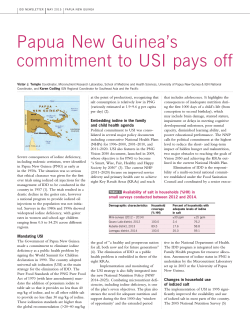
Basic Renal Diet - First Care Medical
FIRST CARE Medical Clinic Basic Renal Diet Chronic Kidney Disease is a condition where your kidneys are not working as well as what they used to. When your kidneys are not working well, it is important to change what you eat and drink in order for your kidneys to be happy and for you to feel better. Fluids Depending upon which stage of kidney disease you are in, your doctor may have you on medication to help clear fluids, so you may not have to limit how much fluid you drink. However as kidney disease gets worse, you doctor will tell you how much fluid to have per day. Protein Limit the amount of meat or other protein you eat to only 1 serving at each meal. Example 1 egg for breakfast, ½ cup of tuna for lunch, and 1 piece of chicken for dinner. Different stages of kidney disease require different restrictions to protein. Talk with your healthcare provider or dietitian to learn more. Sodium and Blood Pressure It is important to control your blood pressure if you have kidney disease, and watching your salt intake is the first line of defense. Too much salt intake can make you thirstier over they day, which can lead to fluid retention. Ideally you want to stay below 3 grams (3,000 mg) per day. However, speak with your healthcare provider or dietitian to learn about how much salt is recommended for you. Avoid using all salt and salt substitutes. Salt substitutes (Lite Salt, No Salt Salt, Sea Salt) can still have sodium or be very high in Potassium. Potassium High potassium levels can be dangerous to your heart. In chronic kidney disease, your potassium may or may not be high. Because potassium is a mineral found in a lot of the foods we eat (fruits, vegetables, dairy), it is important to talk with your health care team and know if you need to avoid it. Phosphorus High levels of phosphorus in the diet may be a sign your kidney disease is advancing and affecting your bones. If your phosphorus continues to be high after monitoring your intake, talk with your healthcare provider about a medication called a phosphorus binder. Blood Sugar High blood sugar can damage your kidneys. So if you are known to have diabetes or pre-diabetes it is very important to monitor your carbohydrate intake and talk with your health care team or dietitian. SAFE FOODS TO EAT Meat and Meat Substitutes Desserts Vanilla Wafers • Graham Crackers Beverages (May be limited) Apple Juice • Grape Juice Cranberry Juice • Lemonade Beef • Chicken • Fish Sandwich Crackers Peach nectar • Apricot nectar Lamb • Turkey • Pork Animal Crackers Clear Soda or Root Beer Veal • Eggs • Tofu While or yellow cake Kool Aid • Snapple Angel Food Cake Crystal Light • Coffee Vegetables Milk/Dairy (Amount may be limited) Broccoli • Cabbage • Carrots Cauliflower • Celery • Corn Cucumbers • Eggplant Green Beans • Green Peas Lettuce • Mushrooms Whole, 2%, 1%, skim Yogurt • Frozen yogurt Cottage Cheese Onions • Peppers • Radishes Mozzarella Cheese Turnips • Water Chestnuts Swiss cheese • Cheddar Cheese Zucchini • Summer Squash Breads/Starches White Bread • Pita Bread Bagels • Dinner Rolls English muffin • Plain Doughnut Waffles (regular) Pasta (noodles, spaghetti) Rice • Tortilla and Taco Shells Grits • Rice Cakes • Flour Cooked or Dry Cereal (without fruit, nuts, bran, or granola) Unsalted popcorn, pretzels, or crackers Fruits (Fresh, Frozen, Canned) Tea • Fruit Flavor Drinks Calorie Boosters Butter • Mayonnaise Salad Dressing • Cooking Oil Sour Cream • Cream Cheese Non-dairy whipped topping Non-dairy creamer Jelly or jam/honey or syrup Candy: hard, jelly beans, mints, gumdrops, taffy, lollipops AVOID: Apples • Applesauce Blueberries • Cranberries Processed/Seasoned or Salted Foods Fruit Cocktail • Grapefruit such as canned soups, seasoned Grapes • Limes • Peaches rice/pasta, potato chips, hot dogs Pears • Pineapple • Plums Tangerines • Watermelon
© Copyright 2025





















